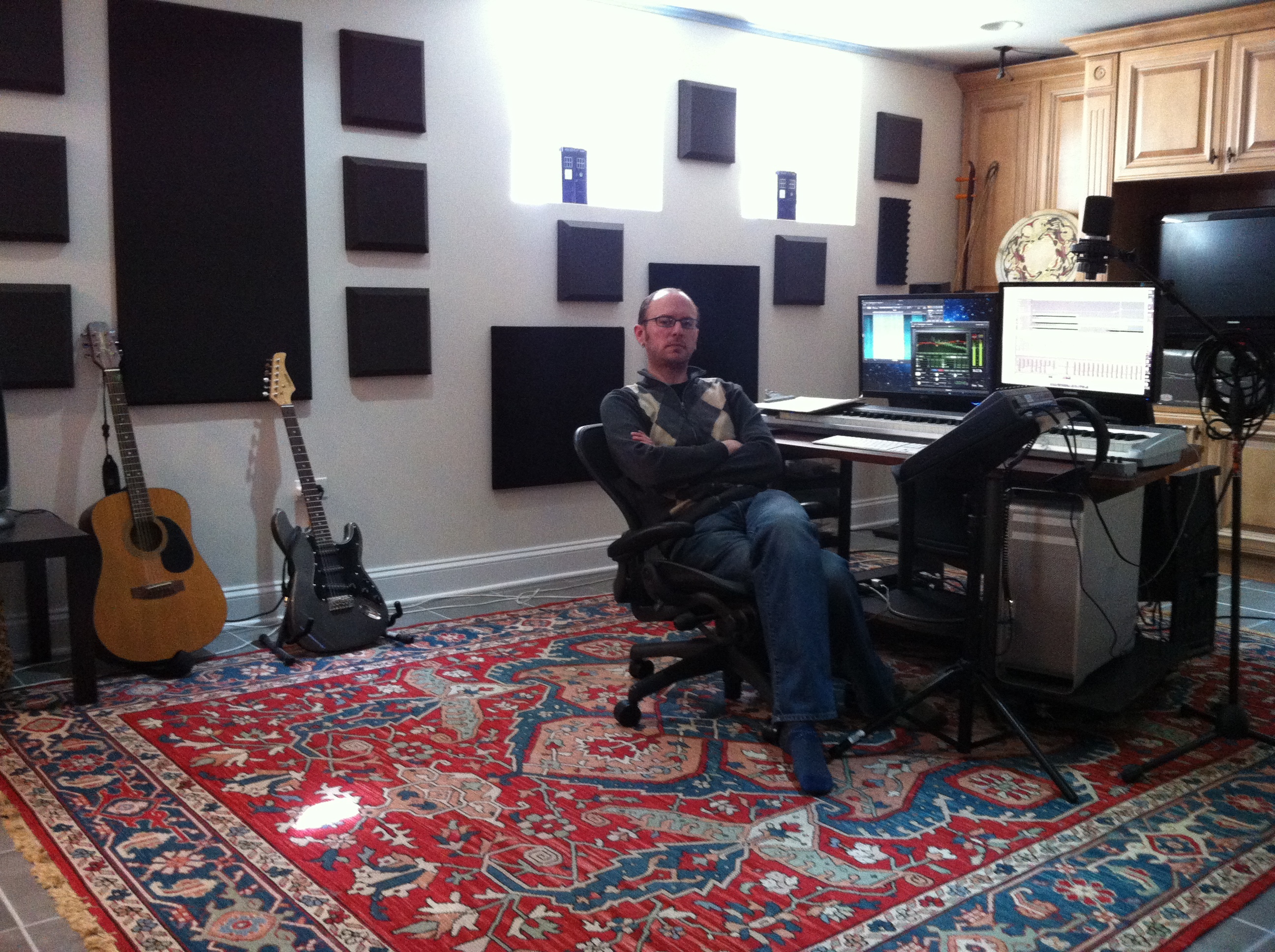
Andrew Edwards, Professor
[flickr id=”8557859328″ thumbnail=”medium” overlay=”true” size=”original” group=”” align=”none”]
Andrew Edwards (Drew) is one of the professors here in the Music Composition for the Screen program. In my opinion, he’s one of the best we got. He teaches first- and second-year graduate students in Film & Film Music History and Game Scoring. He knows more than anyone I have ever met about the topic of Film, and he is an active composer with some exciting projects. He is an excellent composer and a good friend. It was great to be able to ask him some questions and I hope this gives you more insight into the quality professors we have here.
Tell us a little bit about yourself (background, education, what you were doing before coming to Columbia, etc.)
I was born and raised in Urbana, Illinois (downstate), where I received my BA in Music Composition/Theory from the U of I at Urbana-Champaign. After graduation, I moved to Chicago and began teaching music and theatre for the Chicago Park District. In 2000, I left Chicago for Connecticut, where I taught music and theatre at the Hyde School (a college prep boarding school) in Woodstock. Two years later, I left Hyde, played some gigs in England with singer/songwriter John Carlin, and relocated to Brooklyn. I spent the next 5 years there scoring indie films, writing musicals, putting out pop albums, playing with bands, and doing live audio engineering around the city (including a couple of Off-Broadway shows and the TriBeCa Film Festival). In 2007, I came back to Chicago to be a part of the second class of the MFA Screen Music program at Columbia. After graduating in 2009, I came back from LA to start my own studio (Blue Police Box Music), and in 2011 I began teaching in the MFA program.
[flickr id=”8556749641″ thumbnail=”medium” overlay=”true” size=”original” group=”” align=”none”]
What are some recent projects you have worked on?
Last year, I wrote the full score for a “tap opera” called Eyes Without A Face, in collaboration with Mark Yonally from Chicago Tap Theatre and Marc Kelly Smith, the creator of the poetry slam. It was an evening-length dance/poetry adaptation of a French horror film from the 1960’s, and I was very honored to work with such amazing people on it. Additionally, I wrote music for two web series, Trep Life and Dorkumentary TV, as well as a bunch of promos for various things. In April, I had a recording session at The Bridge in LA, which gave me the opportunity to conduct a lovely 50-piece orchestra. We recorded the scores for the documentary Bailout!, the short film Fate Accompli, and the forthcoming fantasy short, The Photographist.
At the end of year, I wrote the score for a feature coming-of-age film, Scary Normal, which just had its premiere. I’m gearing up to start work on the short film Sacrifice with Columbia alum Melissa Marlette, and a feature-length documentary, Alex & Ali, with my frequent collaborator Malachi Leopold. I’m also about to start composing a full-length dance piece for a New York-based dance company. And who knows what else will happen this year?!
What are a couple of things you love about Columbia?
I love that Columbia has a practical angle to their programs. I enjoy the sense in the classroom that what we are doing is actively preparing students for what they want to do. Even though, in my classes, we study classic film scores and techniques, it is all with an eye to the application in the students’ compositional work. I endeavor to make sure everything we do in the classroom is providing the students with a toolkit for their professional careers, and Columbia provides a great framework in which that can happen.
[flickr id=”8557859398″ thumbnail=”medium” overlay=”true” size=”original” group=”” align=”none”]
What’s one thing you would say to budding composers?
Write every day. “Writer’s Block” is a myth. Study the past masters. Educate yourself. Push yourself to experiment and try new things. Hans Zimmer didn’t get to be Hans Zimmer by copying John Williams.
Find your own voice.
What is your compositional process?
I find that my process changes depending on what project I’m working on. Sometimes I’ll create a sonic palette first and let the sounds inform my writing. I still frequently write out sketches by hand on paper. I’m fond of improvising on an idea and developing it. Texture and tone color are very interesting to me, so I like to play with how things sound in different combinations. I tend to work linearly (I never use loops anymore), and I like P. T. Anderson’s “Ironing the shirt” analogy: where I write a bunch, then go back and tweak, then write more, go back and tweak, etc.—like I’m ironing the sleeve of a shirt.
That being said, what I am really obsessed with is structure. When working on a film, I’ll start by finding a tempo (or tempo map) that works for an extended period of time. I’ll then mark important points where shifts in the emotional subtext or the action occur, and use those points to create a framework for the music. The music has a symbiotic relationship with the narrative—simultaneously informing it and being informed by it—and it must always be responding and reacting to what is happening in the film. So I let the film create the structure, and then I write the music accordingly. Setting up these “scaffolds” frees me to write without worrying so much about technical issues. It also allows for each cue to have a unique structure, specifically tailored to the film.
Again, thank you to Andrew for his time and for being a great teacher. If you want to connect with Andrew, like his facebook page here or visit his website here.
